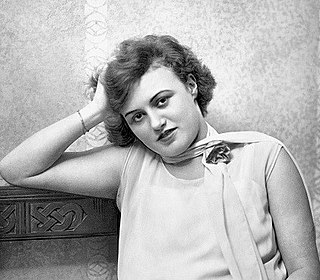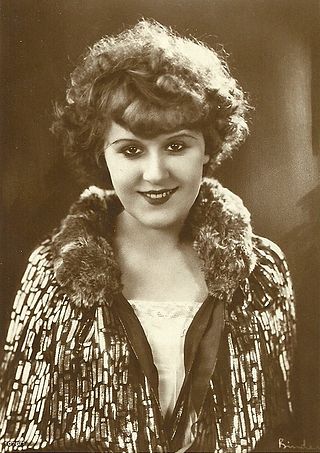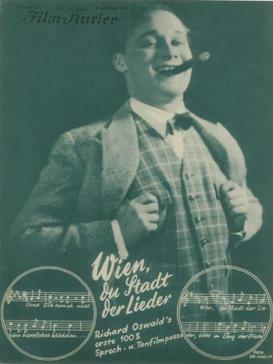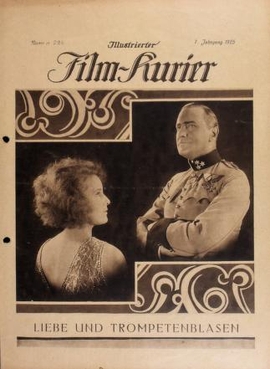Related Research Articles

Camilla Spira was a German film actress. She appeared in 68 films between 1924 and 1986. She was born in Hamburg, Germany, of Jewish ancestry on her father's side, and died in Berlin, Germany. Her father was the Austrian actor Fritz Spira who died in the Ruma concentration camp in 1943. Her mother was actress Lotte Spira and her sister was the East German actress Steffie Spira.

Paul Heidemann was a German actor, comedian, film director, film producer, and opera singer. As a performer, he excelled in various genres and was especially noted for his comedic skills
Hans May was an Austrian-born composer who went into exile in Britain in 1936 after the Nazis came to power in his homeland, being of Jewish descent.

Mary Kid was a German actress. She appeared in more than forty films during the Weimar Republic, but her career came to an end in the early sound era.

Schubert's Dream of Spring is a 1931 German musical film directed by Richard Oswald and starring Carl Jöken, Gretl Theimer and Alfred Läutner. It was shot at the Halensee Studios in Berlin with sets designed by the art director Franz Schroedter. It is a biopic of the Austrian composer Franz Schubert (1797–1828). It was one of two films along with Vienna, City of Song (1930) with which the director paid musical tribute to his native city Vienna.

Vienna, City of Song is a 1930 German musical comedy film directed by Richard Oswald and starring Charlotte Ander, Paul Morgan and Igo Sym. It was shot at the Babelsberg Studios in Berlin. The film's sets were designed by the art director Franz Schroedter.

The Little Napoleon is a 1923 German silent historical comedy film directed by Georg Jacoby and starring Egon von Hagen, Paul Heidemann and Harry Liedtke. It depicts the life and amorous adventures of Jérôme Bonaparte, the younger brother of Napoleon, who installed him as King of Westphalia.
The Gypsy Chief is a 1929 German silent drama film directed by Carl Wilhelm and starring Paul Heidemann, Margarete Schlegel and Fritz Schulz. It is an adaptation of the 1912 operetta Der Zigeunerprimas composed by Emmerich Kálmán with a libretto by Julius Wilhelm and Fritz Grünbaum. Robert A. Dietrich worked as the film's art director.
Lützow's Wild Hunt is a 1927 German silent war film.

Family Gathering in the House of Prellstein is a 1927 German silent comedy film directed by Hans Steinhoff and starring S. Z. Sakall, Erika Glässner and Sig Arno.
The Third Squadron is a 1926 German silent war film directed by Carl Wilhelm and starring Fritz Spira, Eugen Burg, and Reinhold Häussermann. It was shot at the EFA Studios in Berlin and on location in Vienna. The film's art direction was by Otto Erdmann and Hans Sohnle. It was based on a play by Bernhard Buchbinder.

Fritz Spira was an Austrian stage and film actor. He appeared frequently in films during the silent and early sound eras. Spira played the role of the Austrian Emperor Franz Josef in the 1926 film The Third Squadron. Spira had been working in Germany before the Nazi takeover in 1933 compelled him to leave because of his Jewish background. He went first to Poland, then returned to his native Austria. Following the Anchluss he tried to leave, but was arrested. He would die in 1943 at the Ruma concentration camp in Vojvodina.
The False Prince is a 1927 German silent film directed by Heinz Paul and starring Harry Domela, Ekkehard Arendt and John Mylong. It was shot at the Johannisthal Studios in Berlin. The film's art direction was by Karl Machus. The film was based on Domela's book recounting his own adventures in post-First World War Germany when he briefly masqueraded as Prince.

Love and Trumpets is a 1925 German silent comedy film directed by Richard Eichberg and starring Lilian Harvey, Harry Liedtke, and Harry Halm. It was shot at the Johannisthal Studios in Berlin. The film's sets were designed by the art director Kurt Richter.
Unmarried Daughters is a 1926 German silent film directed by Carl Boese and starring Jenny Jugo, Charlotte Ander and Ida Wüst.
Maytime or As Once in May is a 1926 German silent romance film directed by Willi Wolff and starring Adolf Klein, Ellen Richter, and Paul Heidemann.
Two Worlds is the German version of an English-language film directed by Ewald André Dupont.

Love's Carnival is a 1930 German drama film directed by Hans Steinhoff and starring Lien Deyers, Mathias Wieman, and Eduard von Winterstein. The film is base upon the play by Otto Erich Hartleben. It was shot at the Babelsberg Studios in Berlin. The film's sets were designed by the art director Robert Herlth.

The Irresistible Man is a 1937 German romantic comedy film directed by Géza von Bolváry and starring Anny Ondra, Hans Söhnker, and Trude Hesterberg.

Viennese Waltz or Johann Strauss, Royal and Imperial Court Musician is a 1932 German historical musical film directed by Conrad Wiene and starring Michael Bohnen, Lee Parry and Paul Hörbiger.
References
- ↑ Prawer p.185-186